








LL’s report into the dynamic landscape of New Zealand’s retirement villages reveals a flourishing sector, with notable changes and trends shaping the senior living domain. There has been significant growth - an increase of 31.8 percent in village numbers and a striking 79.1 percent growth in unit numbers. This increase in unit numbers highlights the trend of larger, more expansive modern villages.
This year’s NZACA conference was a resounding success, with speakers underlining the difficulties with staff shortages and the stress and burnout of caregivers, nurses, clinicians and GPs. While we know the demand for aged care services will continue to grow, nobody can promise it will
get easier. Whatever the challenge, from providing new beds, equity of access, and staff retention, those working in the sector remain at the core of any solution.
As these trends are navigated, it’s evident that the retirement village landscape is evolving to meet the demands of an aging population, albeit amidst extreme challenges. We further explore the trends and developments in this issue, highlighting the resilience and innovation that define New Zealand's senior living sector.
Tania Walters, tania@reviewmags.comPUBLISHER: Tania Walters
GENERAL MANAGER: Kieran Mitchell
EDITORIAL DIRECTOR: Sarah Mitchell
MANAGING EDITOR: Caitlan Mitchell
EDITORIAL ASSOCIATE: Sam Francks
ADVERTISING SALES: Caroline Boe
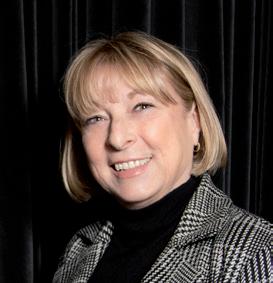

SENIOR DESIGNER: Raymund Sarmiento
GRAPHIC DESIGNER: Raymund Santos
8 News
11 NZACA Interim CEO Katherine Rich
The Aged Care Association held another successful members’ conference 16-18 August which included close to 500 delegates and trade representatives.
12
‘The Domino Effect’ Campaign
The Aged Care Association has launched a multiplatform campaign to urge the government to fix the aged care crisis.
The aged care sector in New Zealand continues to grapple with an issue that threatens the well-being of its elderly population – a significant shortage of nurses and caregivers.
26
Te Pūkenga
Careerforce Te Pūkenga (Careerforce) celebrated its 25th anniversary in 2019 and has supported thousands of people with life-changing qualifications since its inception.

To all New Zealand healthcare businesses (and all New Zealand SMEs, for that matter), you can and should have your own Chief Financial Officer.
In our constant pursuit of sustainable solutions, one area that often gets overlooked is school furniture.
32 Curating Friendly Useable Shared Spaces

The business of caring for older adults is changing.

34 Style

In commercial design for senior living communities, the desire for style over the need for functionality and purpose can often collide.
36 Empowering
As the digital landscape continues to expand, the threat of cybercrime also grows, and aged care providers in New Zealand are not immune.


Care Through Virtual Reality

In 2018, a milestone emerged –individuals over 64 surpassed children under 5 for the first time in history.
38 Using Extended Reality to Improve Mental Health and Reduce Loneliness
One in 15 people aged 50+ is often lonely, rising to one in three for widowed and one in four for those in poor health.
39 Monitoring of Healthcare Systems
Healthcare systems are complex, requiring continuous monitoring to ensure that they provide the best possible care to patients.
PainChek® was developed as a nonsubjective, effective, novel solution to the pain assessment problem.

With snacking innovation, the spotlight often shines on Gen Z's preferences.
Shane Ormshaw, Linda Jones Retirement Village
RSL LifeCare has welcomed the opportunity by the Australian Government to submit a business case to deliver three Veterans’ and Families’ Hubs in critical areas of regional NSW. In partnership with RSL NSW, RSL LifeCare is a step closer to improving access to much-needed services in these communities for veterans and their families following the success of their stage one grant applications.
The announcements are a part of the Australian Government’s $46.7 million commitment to deliver ten new Veterans’ and Families’ Hubs across the country. In consultation with the local communities and other ex-service organisations, a ‘hub and spoke’ model will be implemented by RSL LifeCare and RSL NSW through the network of RSL sub-Branches in the Hunter, Tweed and Queanbeyan regions. More than 70,000 veterans and their families that reside in these regions will have access to a range of critical services that are tailored to the needs of the local communities.
RSL LifeCare CEO Janet Muir said that advancing to this next stage in the bid process is an essential milestone for RSL LifeCare and RSL NSW and their commitment to supporting veterans and their families.
“Since its inception in 1911, RSL LifeCare has been dedicated to supporting Australian Defence Force personnel who have given so much to protect our country. Our hubs are the embodiment of this support,” said Muir.
“As an organisation, we are very excited at the prospect of adding new hubs to our veteran support network in the Hunter, Tweed-North Coast, and Queanbeyan regions, extending the support we can provide to even more veterans and their families.
“I want to give my thanks to the Department of Veterans’ Affairs for recognising the importance of these hubs and
Bupa has announced that Simon Birch will be the next chief information officer for the Asia and Pacific region, following an extensive recruitment process both internally and externally.
Birch has extensive experience in technology leadership roles across major financial organisations, including the Commonwealth Bank of Australia and Barclays in the United Kingdom. He will commence as CIO at Bupa in August 2023,
providing the funding needed for organisations across Australia to provide these important services, and to RSL NSW for its continued support as we look to continue building our network of support services across the State.”
RSL LifeCare, with support from RSL NSW, has established four Veterans’ and Families’ Hubs that provide a holistic range of services to veterans and their families across the Nowra, Riverina, Northern Beaches regions, and Newcastle (in a temporary centre). The services provided include health and wellbeing, education, housing, social support and connection, employment support, income and financial support, and support with making claims for entitlements and subsequent advocacy where required.
RSL NSW President Ray James said veteran communities had witnessed the benefits of these hubs in action since the Nowra and Riverina Veteran Wellbeing Centres were established and that RSL NSW and RSL LifeCare have a strong and sustainable business case to support how the organisations can operate the centres using their combined resources.
allowing for a smooth transition with current Acting CIO Jenny Watson, who will move to the role of Senior Technology Director, Health Insurance and Business Services.
Bupa Asia and Pacific CEO, Nick Stone, said he was delighted to have someone of Simon’s calibre joining Bupa and thanked Jenny Watson for her dedication and stewardship during the past 14 months.
"Simon has significant experience in transforming the technology environments of large organisations and leading digital uplifts, which will be invaluable for Bupa APAC as we continue to modernise, digitise and personalise healthcare for our customers," said Stone.

Stone said Birch was joining Bupa’s APAC Executive Leadership Team during a period of exciting change across its Health Insurance, Aged Care and Health provision services focused on customers and using technology as a way to improve their experience.
Birch added that It was a privilege to be taking up this leadership position.
“This is an organisation that has a true ambition to become APAC’s most customer-centric healthcare company and where technology has a crucial role to play. I look forward to working with all of the passionate people at Bupa to help this amazing organisation go from strength to strength.”

In a world dominated by an ageing society, the demand for the provision of care that older people expect and deserve is rapidly outstripping current support staff numbers and ability.

Kalandra Education Group’s purpose is to meet that demand and, by extending Health Care Assistant knowledge and skills, to optimise the standard of care received by aged people in New Zealand and internationally.
Australia | The country's demographic landscape is transforming, with a significant 17.2 percent of the population aged 65 years or older.
cover topics from Palliative Care and Mental Health in the Workplace to Skin Care for the Elderly and Observation Skills.
This diverse ageing population encompasses various social, ethnic, and experiential backgrounds, reflecting the nation's rich history. The recently released 2021 Australian Census provides a deeper look into this diversity.
Kalandra empowers carers, extending their knowledge and skills and improving the quality and range of care offered to New Zealand’s elder community. Established in 2016, Kalandra is registered and accredited by The New Zealand Qualification Authority and is a Category 2 provider.
Notably, about 1.1 percent of older Australians identify as Aboriginal and Torres Strait Islander, while more than a third hail from culturally and linguistically diverse backgrounds. Moreover, 1.9 percent of older Australians are foreign-born, contributing to the nation's multicultural fabric.
Sanjna Rohit was drawn to a career in elder care because of the unique needs of each individual.
Rohit has studied with Kalandra for one year, graduating with a New Zealand Diploma in Health and Wellbeing (Work Integrated) in November and a New Zealand Diploma in Health and Wellbeing (Practice/ Applied Practice-Level 5) in December.
“Kalandra Education Group was an excellent learning provider. They offer easy access to lecturers who are a phone call, email or zoom chat away if you need assistance with your course.
examination may show how various segments of the ageing population interact with aged care provisions.
“I felt extremely happy to join Kalandra and the support from this organisation was excellent throughout my course.”
Against this dynamic backdrop, the role of aged care services takes centre stage. These services span from enabling independent living at home to offering fulltime care within residential aged care facilities. However, disparities in the utilisation of aged care services have surfaced, mirroring governmental policies, evolving community perspectives, and potential systemic imbalances.
“Older people depend highly on their carers, I wanted to study at Kalandra to broaden my knowledge in health and wellbeing so that I can give the best possible care and improve an older person’s quality of life.”
Rohit noted that Kalandra was encouraging throughout her studies and made learning easy with weekly webinar sessions as well as face-face learning time with lecturers.
Understanding the significance of this inquiry lies in recognising the discrimination safeguards in place for older Australians. Federal laws, such as the Australian Human Rights Commission Act 1986 and the Aged Care Act 1997, stand as pillars of protection, ensuring the rights of elderly individuals are upheld within the aged care sphere.
“Kalandra’s Health and Wellbeing course will provide the tools you need on a daily basis in any health industry you work in.”
A briefing paper is being developed to examine diversity, equity, and inclusion as seen in the patterns of access to and utilisations of aged care services between 2019-2021. This

Rohit found out about Kalandra Education Group through their website. The school offer programme content that is aligned to the latest international standards. Along with programmes from Level 3 to 5, Kalandra also offers short courses that
For anyone thinking about pursuing a career in elder care, Rohit advised taking the opportunity with both hands because it can make a big difference in someone else’s life, and she highly recommended studying at Kalandra.
ww
Level 3 Health and Wellbeing
Certificate in Health Assistance (Level 3) with strands in Palliative Care, Physical Disability Support, Intellectual Disability Support, Community Care, and Mental Health Support.
Level 4 Health and Wellbeing
Certificate in Health & Wellbeing (Level 4) with strands in Community Care Support, Palliative Care, Dementia Care, and Diversional Therapy.
Level 5 Diploma in Health and Wellbeing Diploma in Dementia Care (Work-Integrated) (Level 5).
Short courses for personal and professional development in specific Mental Health, Skin Care, Professional expectations, Communication, and many others.
Clinical specialist topics for healthcare professionals to improve knowledge
Guest Lecture Series free online sessions with healthcare professionals and wellbeing topics of current interest.
ww
Helping solve the problem with staff crisis, introducing NZ IQNs and HCAs to healthcare services. NZ equivalent 4. Minimal referral fee.
Having worked in Aged Care for more than a decade, and now with her diplomas from Kalandra, Rohit is looking forward to a different and more advanced role in the sector.
As Australia's ageing populace evolves, a comprehensive understanding of how different groups access aged care services is pivotal. This knowledge promotes equity and inclusivity and is a guiding compass for creating an enriched aged-care landscape that embraces Australia's diversity.
“I am looking forward to giving all that I have learned and making that difference in someone’s life every day. Knowledge is power – share it and care.”
www.kalandraproducts.com
Sourcing equipment that helps with daily tasks, ensuring safety and providing comfort, from turning beds and masks to suture practice kits, from acute needs to those required for chronic conditions (dementia aids).

by the Department of Foreign Affairs and Trade (DFAT), aims to elevate aged care standards across the Asia Pacific region.
This inaugural cohort of 15 esteemed aged care experts will engage in a multi-dimensional fellowship programme spanning online workshops, experiential visits to Australia, and an upcoming international policy forum. Their immersion will provide insights into Australia's aged care ecosystem and facilitate knowledge exchange.
During their visit to Australia, APACH Fellows will partake in guest lectures, think tank sessions, visits to aged care facilities, and dialogues with health authorities. This immersive experience will expose them to best practices, innovative research, and technology integration within the Australian aged care landscape.
Australia | A distinguished group of aged care specialists from diverse Asian countries is embarking on an enlightening journey to Australia this month as part of the Asia Pacific Aged Care Hub (APACH) initiative. The APACH program, a collaborative effort between ARIIA, Flinders University College of Business, Government and Law (CBGL), and the Caring Futures Institute (CFI), supported
The APACH initiative seeks to achieve multiple goals, including fostering leadership within their home countries, exploring adaptable policy frameworks, forging influential networks, and cultivating communication and collaboration skills. Ultimately, this knowledge-sharing endeavour aspires to catalyse the evolution of aged care across Asia, creating a more interconnected and enriched landscape for elderly care.
A food waste pilot study was conducted in three Arvida communities earlier this year. The study revealed that when residents participated in meal preparation, planning, and service, there was a notable decrease in food waste.

The pilot assessed food and beverage waste from residents' plates, kitchen areas, and buffet spaces. Quantities of wasted items were meticulously recorded and then sorted into various categories. Subsequently, focus groups were organised, during which researchers engaged with Arvida
teams and residents to discuss ideas for curbing food waste. With government funding amounting to $230,000, the programme aimed at reducing food waste is set to expand across New Zealand's retirement and aged care sector. This three-year initiative, facilitated by the University of Otago's Food Waste Innovation, will encompass retirement villages and aged care providers nationwide. The programme aims to establish a baseline measurement of food waste production, from meal preparation to leftover plate scraps.
Jeremy Nicoll, the Chief Executive of Arvida, expressed satisfaction in witnessing the programme's expansion to encompass the broader retirement and aged care sector.
"A programme of this scale will aid us in comprehending the extent of food waste originating from our kitchens and finding effective strategies to mitigate it. As a responsible retirement provider, we established a goal to reduce overall waste by 20 percent per community, and initiatives like this align with our objectives," explained Nicol
"Collective efforts have the potential to drive meaningful change," he said.
According to government estimates, globally, one-third of produced food goes to waste, consuming vital resources such as energy and water. John Collyns, the Executive Director of the Retirement Villages Association, emphasised that a nationwide initiative underscores the sector's commitment to sustainability.
"Our residents and operators are dedicated to playing their part in environmental care. This endeavour will yield substantial benefits for the environment and showcase to other sectors the achievements that can arise when communities unite to combat food waste," said Collyns.
New Zealand retirement villages and aged care
he latest report from JLL titled "Retirement Villages in New Zealand: A Paradigm Shift" delves into the intricacies of the evolving aged care and retirement landscape. The report's compelling insight is that the aging population is expanding and looks at the reimagining of traditional aged care models.
The number of New Zealanders entering this age bracket will start to decrease.
The six largest retirement village operators – Ryman, Metlifecare, Summerset, Bupa, Oceania, and Arvida – the "big six" are significant players in the New Zealand retirement village market. They hold an estimated 48 percent of villages and 65 percent of the country's units. The 'big six' retirement villages employ ~19,560 staff and house ~45,420 residents. For 2022, the top three operators
reported an occupancy rate of an average of 95 percent and an average length of stay for their residents of 5.28 years.
to 46 percent of the total 75+ years population in the country, growing to 48 percent by 2048.
When looking at the forecast growth for the 75+ year age bracket (in 5-year time periods), this shows the number of New Zealanders expanding to this age group is expected to peak in 2038, with an estimated additional 107,780 between 2033 and 2038. After 2038, we expect to see the number adding to this age bracket to reduce, and by 2048 there will be under 10% growth. This is driven by two factors:
The impact of large populations in Auckland, Hamilton, and Tauranga will likely continue to be attractive to potential retirement village residents, continuing the demand within the 'golden triangle'. By 2033, the 'golden triangle' area will equate
In 5-year time periods, the number of 75+ year New Zealanders increases until 2038 when growth numbers start to reduce.
At the forefront of this paradigm shift, retirement villages offer an alternative lifestyle that blends independence, community, and care. With the change in New Zealand's demographics, retirement villages are embracing innovative strategies to meet the diverse needs of an Continued on page 10.
With New Zealand's population getting older, there is an increase in the number of older adults (those 75 and over) who fit the Retirement Village and Aged Care sector demographic.
Continued from page 9.
ageing population.
A critical takeaway from the report is the move towards integrated communities prioritising holistic well-being.
Retirement villages are no longer merely housing solutions; they have evolved into dynamic environments that cater to physical, emotional, and social needs.
This change drives the demand for lifestyle amenities, wellness centres, and healthcare services within the villages. Highlighted is the significance of creating spaces that foster engagement, connectivity, and a sense of belonging among residents.
Technology is a powerful catalyst in this transformation and underscores how digital solutions enhance the resident experience while streamlining operations and enabling remote care. These technologies offer prompt interventions and elevate resident safety to new levels.
Today's retirees demand
more than a place to live; they desire an enriching lifestyle that aligns with their values and aspirations. Prioritising personalised experiences, tailored services, and flexible, adaptable living arrangements that cater to their changing needs.
There is also a rise in the popularity of multigenerational living within retirement villages, reflecting evolving family dynamics, where grandparents, parents, and children can coexist in a community.

On the development front, the report highlights the surge in demand for modern and purposebuilt retirement village facilities. It underscores how innovative designs prioritising accessibility, sustainability, and connectivity are gaining traction. Additionally, urbanisation trends drive the shift towards inner-city retirement villages that offer proximity to amenities and cultural experiences.
As identified in last year's JLL report, associated care facilities are now a vital part of a retirement village's "continuum of care". As a result, 72 percent of the 'big six' operators have villages offering care.
Financial considerations play a pivotal role in the retirement village landscape. The report outlines various pricing models, entry fees, and contractual structures prevalent in the industry. Transparency and clarity in financial agreements emerge as essential elements to foster trust and confidence among residents and their families.
Regulatory and policy considerations are also explored within the report.
The Retirement Villages Act 2003 has laid the foundation for the sector's regulation, ensuring resident protection and transparent operations. The report highlights the evolving regulatory landscape and the role of industry associations in shaping the sector's growth.
As New Zealand's aged
care landscape continues to evolve, collaboration among stakeholders emerges as a key theme. The significance of partnerships between operators, developers, local authorities, and healthcare providers to create sustainable and thriving retirement village communities are pivotal. Collectively, they navigate the complex interplay of regulatory compliance, urban planning, and community engagement.
JLL's research report is a must-read, as it provides a comprehensive overview of the paradigm shift in New Zealand's retirement village sector.
As the number of older adults increases, there will be enormous demand for retirement villages with an ethos of providing residents access to vibrant communities, prioritising well-being, innovation, and personalised experiences.
Download the report here: https://www.jll.nz/en/trendsand-insights

The Aged Care Association held another successful members’ conference 16-18 August which included close to 500 delegates and trade representatives.
Nurse Leadership Group’s presentation. At the Board session, interim CEO Katherine Rich and Anthem director Sarah Geel presented the ACA “Domino Effect” multimedia and public relations campaign, which had been launched to raise awareness of the current crisis in aged care due to chronic underfunding.
The political panel included representatives of the major parties and while each accepted the sector was in crisis it was disappointing that only the Green Party confirmed that an aged care policy would appear in its manifesto leading into the election. Professional director and health commentator Rob Campbell gave an excellent speech and gave delegates food for thought speaking about new concepts and better funding models for aged care, which he referred to as “arohabased care”.
his year it was at Takina, Wellington’s new conference facility which is an impressive venue.
Chair Simon O’Dowd kicked off the conference by celebrating the aged care sector’s dedication to the care of older New
Zealanders and its resilience in terms of dealing with funding challenges.
Other conference highlights were the industry’s award ceremony celebrating innovation and excellence, the Board session where board members fielded questions from members, and the
Economists Brad Olsen and Bernard Hickey covered all the economic indicators including updated demographic and population statistics, while Jehan Casinader gave an inspirational presentation about personal development and mental health. Delegates also participated in many breakout sessions on a range of topics, but of course, like most conferences, many found huge value in catching up with colleagues, trade innovation and friends.
Planning now starts for conference 2024!
The Aged Care Association has launched a multiplatform campaign to urge the government to fix the aged care crisis. ‘The Domino Effect’ campaign features aged care beds crashing down like dominos on everyday Kiwis to highlight the impact that chronic underfunding of the aged residential care sector has on all New Zealanders.

CA interim chief executive Katherine Rich believes it is crucial that Kiwis take note because the aged care crisis affects us all. For those working in the sector and families who have loved ones requiring residential aged care, the worsening issues are no surprise. However, many New Zealanders will be unaware of how the crisis affects the health system and will impact them. The Domino Effect campaign helps to join the dots and raise awareness.
“Almost daily, we hear stories regarding long wait times in Emergency Departments, elective surgery wait times growing, and wards overflowing with patients. This is all linked to aged care. Funding the aged care sector properly would improve the whole health system,” said Rich.
Aged care has been chronically underfunded by successive governments, resulting in a lack of capital investment in facilities. This comes as the sector grapples with rising costs and an acute shortage of 1200 registered nurses. Many providers have had no option but to close beds, with several closing their doors for good. In the past year, over 1000 beds have closed permanently, and 1200 closed temporarily due to staff shortages. More closures are expected to follow.
“When beds and rest homes close, seniors stay in the hospital longer as they have nowhere to go when discharged,
and as a consequence, are blocking beds for other patients,” said Rich. This situation will worsen as the number of older New Zealanders increases. By 2030, we will need 13,200 more beds. If current trends continue, we will have nowhere near that number.”
The Domino Effect campaign also shines a light on the families who have to step in and provide care for their older parents, as well as their own children, while also juggling work commitments. It also highlights the ongoing impact on our health workers who bear the brunt of the overwhelmed and underfunded system.
“It makes it very challenging to attract and retain staff, and we fear these valued health professionals will move overseas where conditions and pay are far better,” said Rich.
The Aged Care Association is asking New Zealanders to support the Domino Effect campaign and spread the word via social media to spur the Government into action.
“We know what is needed. With sustainable funding, we can provide solutions enabling the aged care sector to support the health system, not overload it. The evidence supports this, and it makes good economic sense. We need the decision makers to make it a reality.”
To learn more about the crisis in aged residential care, show your support, and spread the word, visit www.dominoeffect.co.nz
The NZACA 2023 annual conference and trade exhibition took place at the new Tākina Wellington Convention and Exhibition Centre in Pōneke Wellington. With over 600 attendees from around the country, the three-day event featured a bustling trade exhibition with 110 stands and a mix of sessions featuring keynote speakers and politicians.


ServiceIQ | Te Pūkenga is the catering services workplace training specialist. Aged care providers working with us benefit through staff upskilling that empowers and motivates your people. Whether it’s delivering great outcomes with world class service or meeting the most exacting dysphagia requirements, we can help. Contact us for more information at no obligation.

ARCHER CARE has launched our new furniture collection! Elevate your living spaces with our new chairs, recliners and outdoor collection. From timeless classics to modern statements, our collection caters to diverse tastes. Contact us to receive a captivating pamphlet set, and embark on a journey of transforming spaces, lives & environments in Agedcare & Retirement enquiries@archerconcepts.co.nz


ALTURA LEARNING creates high quality online aged care courses which are mapped to NZ legislation, designed by industry experts specifically for the aged care sector. Fit for purpose covering a wide range of topics that meet the compliance requirements across the sector, our unique approach uses video based courses that ensure learning is relatable, authentic and relevant.
www.alturalearning.co.nz

Kalandra Education Group

Kalandra Education Group is a unique training provider, one of the very few that focuses on training staff in aged care and specialities within it. The training is online and supported by the Kalandra team, making it easier for staff to access the National Certificates Level 3, 4 and 5 (multiple specialties) as well as the many short courses for professional development. Supporting care staff is vital, and this Kalandra is proud to have once again sponsored the Community Connects Award, won by Cantabria Lifecare & Village Rotorua | Heritage Lifecare. Their message was simple, involve the local people, and you will add richness to the lives of your residents and staff. Pictured is Dr Christine Clark, Chief Executive of Kalandra, with the two gift baskets that Cantabria received.
Dr Christine Clark, Chief Executive/Founder 0800 525 2637 | 027 499 0142 www.kalandra.ac.nz
Emergency Consult is a 24-hour on-call telehealth service. Friendly and experienced Registered Nurses provide online support (via video consult) to aged care staff and residents. Emergency Consult provides virtual RN oversight, short notice cover, and easy escalation to senior emergency medicine doctors.
Carolyn Stewart - Chief Operating Officer carolyns@emergencyconsult.co.nz | 021 411 974
Jo Sier - Nurse Lead, Aged Care jo@emergencyconsult.co.nz | 021 456 386

Nick Gill and Ari Kloeten were in action on the Mico trade stand showcasing some of Mico’s Aged-friendly bathroom products, the service we offer to the Aged Care industry and the support our devoted Aged Care Team provides to Retirement Villages and Care Facilities across NZ.
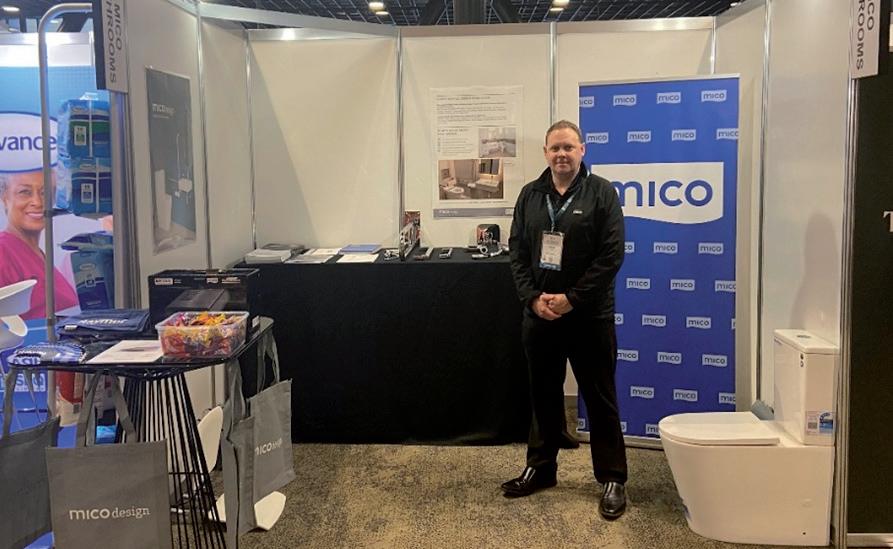


Mico is the Aged Care expert when it comes to specialised fixtures, customised bathroom design and competitive packages, so reach out to Ari or Nick for all your Aged Care requirements.
Nick Gill nick.gill@mico.co.nz | 021 839 522 www.mico.co.nz

Conference Silver Sponsor Careerforce Te Pūkenga, promoted their full range of Health and Wellbeing training programmes. The Winter Booster campaign with free enrolments on Level 2 & 3 programmes until the end of September 2023 was a highlight, and the Tree of Recognition, where people could nominate their aged care heroes, was also a success.

Te Pūkenga Trading as Careerforce susan.tattersall@careerforce.org.nz
0800 277 486 | +64 3 374 1319 careerforce.org.nz

The Rhima Deko 190 is a combined washer disinfector that flushes, washes and disinfects all ward items in one contained process according to ISO 15883-3. No pre-sluicing is required with any of our machines; it will do the dirty work for you. It will also fully clean and disinfect itself, including the wash chamber, water tank and outlet.
Rhima
1300 347 944 www.rhima.co.nz

Arjo was delighted to be part of the NZACA Conference and enjoyed interacting with many delegates. For further enquiries on the Ceiling & Portable Hoists, Hygiene equipment and Seating Matters chars, please contact:


Arjo info.nz@arjo.com | 0800 000 151 www.arjo.com
Archer Care has launched our new furniture collection! Elevate your living spaces with our new chairs, recliners and outdoor collection. From timeless classics to modern statements, our collection caters to diverse tastes. Contact us to receive a captivating pamphlet set, and embark on a journey of transforming spaces, lives & environments in Agedcare & Retirement. enquiries@archerconcepts.co.nz

Archer Concepts
laurinda@archerconcepts.co.nz
09 431 2470 | 021 086 05261 www.archerconcepts.co.nz
Gooder Equipment was delighted to attend this year's NZACA conference and is proud to offer a wide range of commercial laundry equipment from the Primus, Huebsch and Maytag brands.


We are happy to visit your facility to offer advice, measure and quote. Call us on 04 566 9124
Gavin Reid
greid@goodequip.co.nz | 027 446 1725
www.gooder.co.nz



The New Zealand Aged Care Association Conference 2023 marked the opportunity to look back over the last year's challenges and the resilience of the sector. The conference blended retrospection with anticipation, acknowledging the challenges of the past year while emphasising the determination to uphold the wellbeing of the elderly. Various speakers, including Simon O’Dowd and Emma Prestidge, highlighted the resilience within the sector amid tough times. Discussions revolved around key themes such as health system reforms, quality of care, and addressing complaints.

Dr Shane Reti emphasised the need to move beyond pandemicrelated hindrances and focus on workforce, infrastructure, and


operational aspects. Political representatives reached a consensus on the urgency of addressing the aged care crisis while differing on strategies for implementation. Dr Bryan Betty addressed workforce burnout, particularly among GPs, pointing to the cyclical pressure between hospitals and primary care.


The conference offered a mix of insightful talks, touching moments like the gala dinner with a heartfelt waiata, and music by Vincent and the Hateful 8. Economical impacts were discussed, as Brad Olsen delved into global economic trends affecting aged care. Rob Campbell questioned the allocation of funding, comparing it to spending on infrastructure projects. The Nursing Leadership Group emphasised storytelling and the increased numbers in nursing training, aiming to promote how rewarding working in the aged care sector is.
Conference 2023 reinforced that despite growing demands and challenges - provision of new beds, equity of access, workforce retention - at the core, the solution lies in the dedication of those in the sector.



























Since coming to New Zealand at the age of 15 as a homestay student from China, Joy Yang has gone on to craft a career in the Aged Care sector.
fter graduating with a degree in nursing in 2018, Yang has quickly risen up the ranks at Ryman Healthcare’s Edmund Hillary Retirement Village, starting as a registered nurse before quickly progressing to Unit Coordinator, working in both Special Care and Hospital Units.
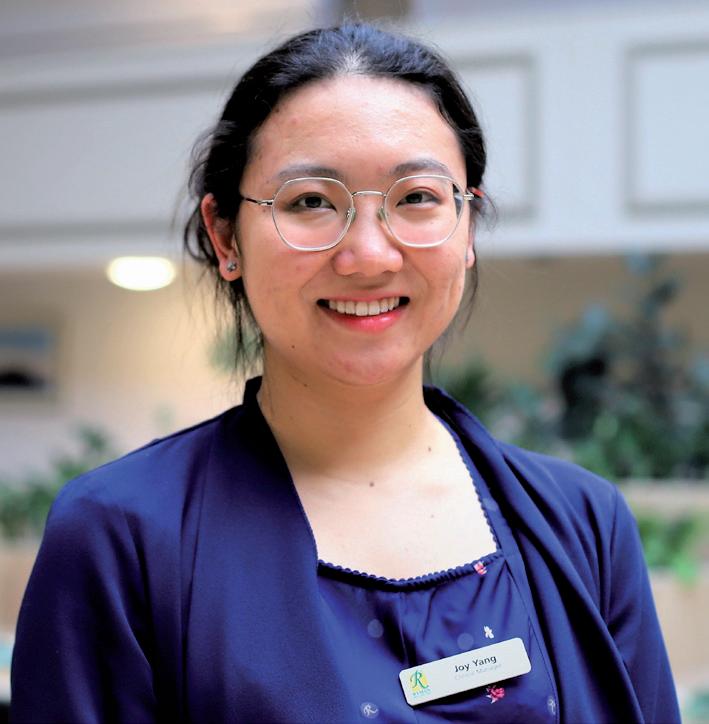
Yang first came to the village in her third year of university on practicum, which involved interviewing a serviced apartment resident. She admitted that her first impression of the village was its resort-like fountain at the entrance.
“I was amazed by the concept of independent living and assisted living. I was also impressed by

the helpful village community and the wonderful activities the village organised,” said Yang.
From here on in, Yang knew that she would like to work at Edmund Hillary Retirement Village permanently one day, describing it as her dream workplace.



Taking on a leadership role was a big step for Yang, who admitted she was out of her comfort zone. She said that she felt shy when she first started and that a huge amount of personal growth was required. Yang was also encouraged by the support of her team to pursue the role.
Yang has also worked as a Clinical Manager since October 2021, overseeing three different hospital units.
Gaining the courage to speak to residents was a whole new world for Yang, who expressed interest in hearing people’s different backgrounds and life experiences. She said it was the small things like a smile that could ultimately make the difference.
In her own words, Yang was drawn to Ryman Healthcare due to the many opportunities available, the support that’s provided, and the care for staff, which was particularly appreciated during the Covid-19 pandemic.
Knowing she is making a positive difference in how residents feel is a hugely satisfying aspect
of the job. Yang said that it is also rewarding to be an advocate for residents and assist them to be comfortable in their journey. Yang also extends the rapport to the residents’ families, understanding that good communication is vital for that relationship.
“When we are showing the families through, we have that initial bonding then. I just think about what I would want to know, and that’s what I deliver to them. These relationships can be very rewarding too.”
Yang said there is always innovation at Ryman, and there are constant reviews of what can be done to improve both residents’ well-being and safety in the workplace. Knowing she is making a positive difference in how residents feel is a hugely satisfying aspect of her job. Seeing residents getting better in health and happier in her care is something she finds personally rewarding.
“The most amazing aspect of working in the village, though, is the constant emphasis on kindness, which is so strong it’s palpable, It is in the air, and you can feel it as soon as you step in the building every day.”
Metlifecare
Metlifecare has long been a communityfocused company that creates extraordinary living experiences for its residents and employees.

or sales executive Marie Kake, the company means meeting new people from all walks of life.
"Helping people find the most suitable village with a welcoming and comfortable feeling and a unit, apartment or villa in which they feel safe and happy is the best part of my job," said Kake.
The youngest of seven children, Kake's family is

extensive by today's standards. Between the siblings, they have 38 children and 52 grandchildren to date. Kake said that this is one of the reasons that she loves to be around so many people.
Her journey with Metlifecare began in 2015, and she said time has flown by in a flash.
"Over my nine years with Metlifecare, I have seen the company's huge growth, which has been exciting and challenging simultaneously, but ultimately very satisfying," said Kake.
Throughout this growth phase, Kake has worked directly on resale opportunities through Metlifecare's Hillsborough Heights and Parkside Villages, which she said was a highlight of the past 12 months. Both villages are in central Auckland, with various living options available, from independent at Hillsborough Heights to dementia care at Parkside.



Making a positive difference in people's lives is the best part of working within the aged care sector for Kake.
"Many of our residents are so happy once they have settled into our villages, and so I get lots of smiles, waves, and wonderful chats, which is the best part of my working day."

In the future, Kake is committed to the continued growth of Metlifecare within the aged care sector. Although Kake admitted that one of her goals was to become proficient with the new internal computer system, refreshing dynamic personal skills is just as critical to her role.
Her role requires patience, respect, and kindness to achieve the desired results. Kake said that the most essential part of working as a sales executive in the aged care sector is to be genuinely interested in the residents and their families and appreciate their life stories.
"I am genuinely grateful and humbled to have worked alongside so many wonderful people here at Metlifecare.
The aged care sector in New Zealand continues to grapple with an issue that threatens the well-being of its elderly population – a significant shortage of nurses and caregivers.
and caregivers directly impacts the quality of care in villages and care facilities. Overburdened staff may need help to allocate sufficient time and resources for individualised attention and comprehensive care for each resident, leading to missed medication schedules, inadequate supervision, and an absence of emotional support for elderly individuals who often rely on these caregivers for companionship and comfort.
As the country's demographic landscape evolves, with an increasing number of older individuals, the demand for highquality care and support is growing rapidly. Unfortunately, the supply of skilled healthcare professionals in the aged care sector has struggled to keep pace for years. Voices raising concerns about the nursing and caregiver shortage are growing ever louder.
Village closures, lack of beds and the strain on existing providers mean more must be done.
A Growing Ageing Population: Like many other developed nations, New Zealand is undergoing a remarkable demographic shift. The increasing life expectancies and improved healthcare have led to a notable rise in the ageing population. While this indicates the progress of medical care, it presents a unique set of challenges, particularly in the aged care sector. As the number of elderly individuals rises, so does the demand for specialised care that caters to their distinct medical, emotional, and social needs.
The Strain on the Workforce: The need for more nurses and caregivers in the aged care sector exacerbates an already stretched workforce. With a burgeoning population of elderly individuals requiring assistance with daily tasks, medication management, and medical attention, the pressure on healthcare professionals is immense. Long working hours, physically demanding responsibilities, and the emotional toll of caring for elderly patients contribute to burnout and decreased job satisfaction among those dedicated to the sector. Then, there is the issue of trainee nurses not wanting to work in the aged care sector.
Impact on Quality of Care: The shortage of skilled nurses
Addressing the Challenge: Everyone agrees that addressing the shortage of nurses and caregivers in the aged care sector requires a multifaceted approach. Initiatives that incentivise more individuals to pursue careers in nursing and caregiving through scholarships, incentives, and specialised educational programmes can contribute to an increased pool of qualified professionals. The closing of our borders through COVID-19 for clinicians, doctors, nurses and caregivers should never have happened. New Zealand should have continued to grant visas to those wishing to work in health or education. Many potential staff were lost to other countries, and we were very slow to notice how other countries were working to attract staff, particularly when they were poaching from New Zealand.
Retention Rates: By providing competitive salaries, reasonable work hours, and a supportive work environment, the strain on the existing workforce can be alleviated, improving job satisfaction and retention rates.
Immigration Policies: Continued work on New Zealand's immigration policies and the current straight-to-residence pathway are needed to encourage working and living in New Zealand.
Good PR: Raising awareness about the importance of aged care and the meaningful impact that caregivers and nurses have on the lives of older adults can attract more individuals to the sector, bolstering its workforce.

Technology: Utilising technology to streamline administrative tasks and offer remote support, such as telehealth, can help alleviate the workload of caregivers and nurses, allowing them to dedicate more time to direct patient care.
The shortage of nurses and caregivers in New Zealand's aged care sector is a multifaceted challenge requiring collaborative efforts from the Government, healthcare organisations, educational institutions, and the villages.
Tackling this issue is paramount for the sector's resilience as we enter this next decade of high demand.

Careerforce Te Pūkenga (Careerforce) celebrated its 25th anniversary in 2019 and has supported thousands of people with life-changing qualifications since its inception. Each year, it supports nearly 20,000 people across Aotearoa in workplace-based learning programmes and works with over 2,000 employers.


or most of this time, it also had responsibilities for standard setting and skills development. However, these recently transferred to the newly established Workforce Development Council, Toitu te Waiora, due to the Reforms of Vocational Education (RoVE). Through its longstanding partnerships with industry, Careerforce has established an intimate understanding of the sectors it supports and their challenging operating environments. Most importantly, it understands its workforce development challenges and creates tailored training plans where employers maintain control over their staff training, ensuring that it continues to meet its organisation's changing needs.
In September 2022, due to RoVE, Careerforce transitioned as a business division into Te Pūkenga, the New Zealand Institute of Skills and Technology.

"It's exciting times for Careerforce and the employers and learners we support," said Rod Bentham, Executive Director of Careerforce Te Pūkenga, "As an Industry Training Organisation, we were limited in our ability to support actual training delivery in the workplace. Now, as a provider within Te Pūkenga, these shackles have been removed, and we are exploring new and innovative ways of supporting learners through their training programmes.
"We can also leverage Te Pūkenga's scale and nationwide infrastructure to continue to improve learner supports and outcomes."
Careerforce has a dedicated field team of 70 nationwide staff with extensive sectoral experience and knowledge. These 'on-theground' training specialists work closely with employers and learners to support the completion of nationally recognised NZQA qualifications. They also support a nationwide network of over 800 workplace-based assessors, a critical cog in the success of workplacebased learning. These assessors observe and assess competency in the workplace, ultimately ensuring that the quality of the training meets their organisational standards and any statutory requirements.
Within aged residential care and across 2022 alone, Careerforce enrolled over 4,000 new learners, and nearly 4,000 learners completed a qualification and has forged a reputation as the clear provider of choice to the aged care sector. Careerforce supports the development of a trained and competent workforce, which is critical to addressing the increasingly challenging workforce issues facing the aged care sector.
"We are passionate advocates for skill development in the aged care sector and have built our reputation on continuous improvement of our offering to ensure that it meets the everchanging needs of our ageing population and ultimately improves the care that they receive," said Stephanie Clark, General Manager for Employer Services at Careerforce Te Pūkenga.
Across 2022, Careerforce also launched its Apprenticeship in Advanced Care and Support, warmly received by the aged care
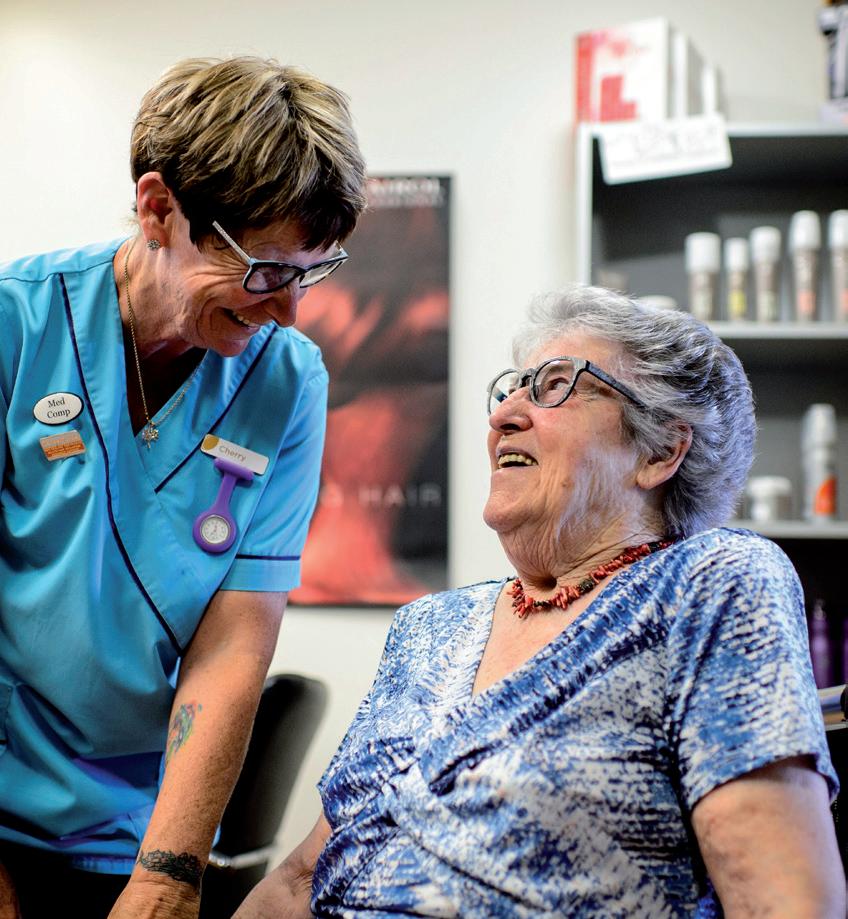
sector as it attracts the Government's $500/mth Apprenticeship Boost wage subsidy (as does its Apprenticeship in Diversional Therapy). It already has over 400 learners working in aged residential care nationwide completing this apprenticeship programme.
"We know that the work-based learning model is very effective for the over 2,000 employers we work with. It also works for their staff as it is very practical based, and in many instances, formally recognises the skills and competencies they already have," said Bentham.
A key distinction is that workplace-based training programmes are competency-based, and learners can work at a pace and place that meets their own development needs. Typically, staff do not need to leave the worksite, and the learning is done within their day-to-day work - they are 'earning and learning' and not incurring student debt.
"We are proud of our relationships with the aged residential care sector built over many years.
"We listen, and we adapt, reflected in the very high and stable levels of satisfaction and enrolments from the sector. While our name may be changing, and we are now part of a larger organisation, the one thing that won't change is our absolute dedication to our employers and learners", Bentham concluded.


FOs can now support you like you are likely to have your Lawyer or tax specialist. Like these external expert providers, there has been a move in the commercial CFO world to provide a similar "pay as you need" service offering.
A large organisation will likely have a strong finance team led by a full-time CFO. Smaller organisations are less likely and, simply put, can't because they're too expensive. Introducing the "virtual CFO."
A virtual CFO is a highly commercial and highly skilled finance professional with years of experience. Some Virtual CFOs will be part of an extended network of financial service providers, and others will work independently.
Most Virtual CFOs will have come from years as full-time CFOs and are now looking to move their experience from one organisation to multiple client businesses. The most straightforward
description is that they're part-time, although the word "virtual" seems to have stuck. They will likely balance their Virtual CFO work with taking up Board positions and may be other lifestyle changes after working 60-hour weeks for much of their careers.
It is essential to do your research when deciding to engage a Virtual CFO. A recent Chartered Accountants Australia and New Zealand article advised that some firms offer Virtual CFO services, completing tasks such as bookkeeping and providing a bit of advisory to public practice firms that conduct monthly and annual financial statements and income tax returns. This is different from what a Virtual CFO does.
A true virtual CFO will provide a service equivalent to a full-time CFO, only part-time. The Virtual CFO should be seen as part of your greater healthcare business team. It is about more than just providing forecasts, reports, and analyses. The Virtual CFO is about helping the business
To all New Zealand healthcare businesses (and all New Zealand SMEs, for that matter), you can and should have your own Chief Financial Officer.
focus on successful strategies and managing performance through accountability, not finalising their annual accounts.
The role of a virtual CFO should be someone from a skilled financial professional with both commercial and financial expertise at a fraction of the price of hiring a full-time CFO based on time. This may be by the hour, day, or another mutually agreed time frame. Ideally, a Virtual CFO would have previously worked across banks, external auditors, lawyers, property or business valuers, or as an insurance broker, to name a few, and be able to engage at their level on your business's behalf. It is also important for a Virtual CFO to be impartial to your business and able to recommend strategies without bias.
Another vital step is to form a relationship before you require a Virtual CFO, such as a Lawyer. Engaging the wrong person who doesn't understand your business could cost a lot for a relatively little positive outcome. The Virtual CFO can assist when you and your Board are not receiving timely or meaningful reporting on the performance of your business. This includes assisting with sometimes complex forecasting of banking covenant ratios or obtaining further capital or debt funding.
The right time to hire a Virtual CFO would be to assist with significant growth within a business' revenue, assist with financial reporting, or if there are plans to sell the business within the next three to five years. A Virtual CFO would also be helpful
in moments such as business acquisition or when guidance is needed on connecting with future financial performance. A Virtual CFO is generally expected to have a finance-related university degree, professional accountancy qualification, and sufficient relevant experience. You are also looking for a Virtual CFO with demonstrated experience working in a commercial business environment and strong business acumen.
Technologies, such as video calling, are 'tools of trade' for all Virtual CFOs, with many working from a home office and very well set up and resourced to ensure a high quality of communication. Of particular benefit is that geography is no longer an issue, and if your business is in Invercargill, you can work effectively with your Virtual CFO in Auckland.

By engaging a Virtual CFO, you can expect profitability improvements, improved management reporting, and a more effective and efficient accounting team. This gives you more time to focus on your business and make better decisions, ultimately allowing you to see profitability improvements.
A Virtual CFO is highly affordable when, like a lawyer or valuer, the cost is based on a 'pay as you need' service. You will get the best return on investment by including your Virtual CFO as part of the team. This is how a Virtual CFO will get to know your business and provide the best value.
In our constant pursuit of sustainable solutions, one area that often gets overlooked is school furniture.
hile commonly seen in classrooms worldwide, laminated desktops pose a significant challenge regarding repair and endof-life disposal. However, an Auckland-based startup company, Critical Design, has recently embarked on a project to transform old desk frames with innovative desktops made from compressed recycled plastic. We had the opportunity to speak with Rui Peng, the CEO of Critical Design, to learn more about this groundbreaking initiative.
Laminated desktops have long been a common fixture in classrooms worldwide. However, the issue arises when these desktops become damaged or broken, often resulting in a complicated and costly repair. Recognising this challenge, Critical Design, an Auckland-based startup company, has embarked on an innovative project to transform
old desk frames with its revolutionary Cleanstone panels built from compressed recycled plastic.







Under the leadership of CEO Rui Peng, Critical Design aims to provide a sustainable alternative to traditional laminated desktops. The Cleanstone panels offer unparalleled durability and longevity thanks to their moisture-free composition. Unlike laminated desktops, which can be challenging to repair, the Cleanstone panels can be easily sanded and polished when marked or damaged, ensuring a cost-effective and efficient solution.
What sets Cleanstone panels apart is their versatility in design and customisation. Critical Design offers a wide range of colour options, allowing each panel to be tailored to the client's preference. Furthermore, the panels are crafted from various recycled plastics, such as bubble wrap, plastic bags, piping, and netting, offering diverse design possibilities that help combat the carbon emissions associated with plastic waste.
Environmental sustainability is at the heart of Critical Design’s mission. The company aims to make a lasting positive change by utilising sustainable technology with minimal environmental impact. The Cleanstone panels are just one aspect of their commitment. Critical design ships these panels worldwide, extending their influence beyond the local market. Moreover, the company has established a system to buy back panels in end-of-life condition, ensuring they can be repurposed into new products rather than ending up in landfills.

In addition to its environmental focus, Critical Design provides a 20-year lifetime warranty for the Cleanstone panels, underscoring its confidence in its durability. This commitment to quality and longevity reassures schools and educational institutions to invest in a sustainable and reliable solution for their desks.



CEO Rui Peng explains that Critical Design's
vision extends beyond desk refurbishment. Their ultimate ambition is to eliminate the dumping of plastics in landfills, making way for a future where sustainability is the norm. By leading the way with their Cleanstone panels and their dedication to ongoing improvements, Critical Design is shaping the future of sustainable design, benefitting both people and the planet.

The Cleanstone panels by Critical Design represent a significant step forward in school desk sustainability. With their durability, customisable design options, and unwavering commitment to the environment, these panels offer a compelling solution for schools seeking eco-friendly alternatives.



By choosing Cleanstone panels, schools can contribute to a greener future while providing students with a sustainable and inspiring learning environment.


n this ever-evolving scene, common areas are also experiencing a digital makeover as living spaces are designed to provide better facilities for residents. One significant change is how tech has become a part of shared spaces. Think about lights and curtains you can control with your phone or a remote – it's not just for hotels. This kind of addition is about making life easier, adding things everyone needs these days. Like making sure there are spots to charge phones that are easily accessible, along with consistent WiFi everywhere. And we're not just talking about sticking a charger in a corner – this is all about smart solutions that meet the residents' needs.
Technology is making its mark in retirement villages and aged care facilities. The ability to charge multiple devices while simultaneously being involved in various activities allows residents the freedom to peruse digital content on tablets or smartphones while dining or participating in shared activities.
Putting those charging spots where residents can easily access them is a game-changer. It's all about mixing convenience and engagement. The seamless incorporation
aligns with the varied needs of these shared spaces, spanning libraries, lounges and dining areas.
The layout of shared spaces is often another factor in the reluctance of residents to spend time with others. Some common areas look more like hotel lobbies. While a row-byrow or square layout is often used to allow for walkers and wheelchairs, it does make it difficult to converse in a group and provides a sterile, hospital-like setting.
Design issues in common areas result in relatively healthy residents preferring isolation in their rooms far more than necessary, which does not support their mobility or cognitive and emotional health.
Imagine making these shared areas feel more like home. Adding personal touches and favourite belongings can work wonders. It's like creating mini homes within the space. Placing residents' possessions in common areas – fixing pictures to walls (so they are not removed and don't interfere with cleaning operations), adding craft or games tables, plants, artwork, or comfy chairs can change an unused space to a place that residents want to be in.

The aged care demographic landscape is evolving, and elder care is undergoing a significant transformation. As boomers move into retirement villages and care facilities, digital innovations are changing the design of villages.
Lighting is one of the most essential functions for shared spaces, always making the space useable.
As new generations retire, so do their expectations. Residents consistently seek an ambience of comfort and adaptability, rendering common spaces pivotal for relaxation and multifunctional utility.
Guiding the design of these hospitality-centric settings necessitates innovative curation of furnishings and decor.
Lighting is one of the most essential functions for shared spaces, always making the space useable. Connecting lighting to a singular touchscreen controller creates a stress-free way of balancing visibility, task lighting and general ambience lighting. Regardless of the use of the shared space, from watching television to crafts or card games, there will always be a preferred lighting tone for any activity. Integrating lighting control technology benefits the use of multipurpose space.
Providing comfortable furniture is vital to a space designed to feel like home. The Ton Albu Lounge Armchair is an impressive design that combines a natural wooden element with soft textiles to suit any room ambience. From luxurious leather to pastel tones, the Ton Albu Lounge Armchair offers a balanced form and is perfect for the corner of a room or in a group seating layout. An ideal feature for aged care villages is that the chair has ergonomic features, allowing adjustability with pocket springs to ensure all residents can use it easily.


The Ton Casablanca table is the perfect side table for easy access in and around a shared space whilst offering convenient functionality. Placed next to an armchair or on either end of a sofa, the Ton Casablanca Table would be ideal for various purposes. Its size of 70 x 70 centimetres makes it a spacious way to serve multiple people, and as it is available in a range of styles and colours, it would
make the table versatile to any interior.
To encourage residents to catch up in a group setting, the Alex Modular Sofa by Forgia allows seating to be customisable to the needs of the space, including one, two or three-seaters with a deep and comfortable feel. A vital element is the corner-friendly configuration, enabling guests to interact, chat, and enjoy the space together. The Alex Modular Sofa has a generous seat size, making it suitable for all residents. The square-shaped frame of the sofa is also ideal to maximise surrounding space.
Adding the personal touch can often be difficult when catering to as many guests in a retirement village, especially when residents are unfamiliar with new surroundings. Digital picture frames allow various photographs to be displayed in communal areas and, when played on a loop, allow the space to have a memorable and welcoming atmosphere.
Digital picture frames are low-cost, easy to operate, and can easily be fixed permanently to a particular shelf for all to enjoy. There is a vast range of frames to choose from to suit interior styling and ambience, with most products on the market able to simultaneously accommodate tens of thousands of photos.


In commercial design for senior living communities, the desire for style over the need for functionality and purpose can often collide.
hile the charm of exquisitely curated coffee table books, artful trays, candles or diffusers is undeniable, these aesthetics can present challenges in spaces that serve as gathering spots for diverse visitors.
Consideration needs to be given when selecting accessories for senior living spaces for the practicality of cleaning and maintenance. These areas undergo regular cleaning routines executed by staff members who may not prioritise the intricacies of design due to time constraints. Items thoughtfully positioned on a coffee table can easily be displaced during cleaning and returned without regard to the original aesthetic.
With various individuals with differing needs using the space, there is the chance of unintended rearrangement or even the removal of items.

Adopting foolproof senior living decorating ideas is a must to balance maintaining aesthetic appeal and ensuring practicality.
Resist the urge to over-lay decorations. Opt for

a few items on large surfaces like side tables. A trio of vases, a prominent floral arrangement, or a substantial artwork can establish visual impact without compromising upkeep.
Delineating spaces for accessories can help mitigate the risk of unexpected repositioning. Incorporating a lengthy floral arrangement or sculpture above furniture, such as a credenza, helps anchor items in place and reduces the likelihood of displacement.
Employing trays is a practical approach to containing multiple items. Placing a selection of coffee table books and a small sculpture on a tray simplifies maintenance, as only one item needs to be relocated for cleaning rather than several.


Developing a comprehensive plan outlining all accessories' placement can be invaluable. This map can be instrumental in addressing unexpected reconfigurations and even serve as a list for insurance purposes.
Implementing these practical strategies in senior living communal spaces can balance aesthetic appeal and operational convenience.






In 2018, a milestone emerged – individuals over 64 surpassed children under 5 for the first time in history. This realisation ignited a spark of inspiration, leading to the birth of SilVR Adventures. Founded to address challenges within the aged care sector, SilVR Adventures leverages technology to reshape the care landscape for older adults.
he founder's curiosity was piqued by this demographic shift, prompting a search for solutions to the challenges faced by the aged care industry. This exploration led to the discovery of many problems, each representing a potential avenue for innovation.
Among these challenges, the plight of mental health, isolation, and solitude among older adults struck a chord. Surprisingly, nearly half of aged care residents had never experienced the presence of a visitor. Driven by a passion for technology, a visionary idea began to take shape – could virtual reality (VR) hold the key to addressing these issues? So began the journey of SilVR Adventures, a venture dedicated to alleviating loneliness and fostering meaningful connections through shared VR experiences.
Fast forward to the present, and SilVR Adventures' VR solution has become a beacon of hope across aged care homes, retirement communities, hospitals, and disability care providers. By bringing individuals together in group VR sessions, the company is effectively combating depression and loneliness, enabling participants to relive memories, check off bucket list items, and revisit cherished places. This approach enhances familial bonds and significantly improves the quality of life for seniors.
What sets SilVR Adventures apart is its commitment to personalised innovations within the aged care sector. Beyond mere entertainment, the VR solution is a tool for forging deeper connections among participants. With the capacity to host up to 40 participants from various

locations, the platform is a hub for fostering social engagement and interactions, even in a virtual world. Additionally, SilVR Adventures has integrated tools that trigger recollections by revisiting significant locations, with the added enhancement of personalised music and photos.

The impact of SilVR Adventures' work is evident through heartwarming stories of transformation. Couples find themselves transported to their younger days, reconnecting and laughing together. Strangers are united through shared VR adventures, forging newfound friendships. Individuals revisit memories tied to specific places, rekindling emotions and igniting conversations.

Looking ahead, SilVR Adventures is poised to embrace an even brighter future. Through a partnership with Amazon Web Services, the company has expanded its reach by bringing VR content into multiple languages, enabling its solutions to reach a wider global audience. The company's involvement in prison rehabilitation and collaboration with Deakin University on dementiabased research showcases its commitment to continuous innovation. As the company delves deeper into AI, data, and analytics, its VR solution is set to evolve further.


One in 15 people aged 50+ is often lonely, rising to one in three for widowed and one in four for those in poor health. Loneliness and social isolation have numerous health consequences, including a 26 percent increased mortality likelihood and more than doubling the risk of developing dementia. Lonely individuals are more prone to both depression and suicide.
he pressing issue of loneliness among the ageing population is one that the Planet Wellbeing project in the UK has harnessed the potential of virtual reality (VR) technology to address.

Spearheaded by power-assisted exercise experts Innerva, this initiative involves a consortium that includes immersive technology specialist Pixelmill Digital, Sheffield Hallam University's Advanced Wellbeing Research Centre (AWRC), and Age UK Sheffield. Funded through Innovate UK's 2023 Mindset Extended Reality for Digital Mental Health competition, the project seeks to leverage immersive technologies for enhancing mental health and wellbeing services.
Loneliness is a pervasive challenge affecting a significant portion of older adults. Planet WellBeing, to combat this issue, introduces a virtual world where older adults can engage in enjoyable activities, connect with peers, and alleviate feelings of isolation.
Jon Hymus, Commercial Director of Innerva, emphasises the project's aim to provide a safe, engaging, and inclusive virtual world that addresses the mental health and wellbeing challenges older adults face. The development process
of Planet Wellbeing is grounded in feedback from older individuals to ensure it caters to their needs and can be accessed irrespective of physical capabilities.
The project's impact will be rigorously assessed, delving into its influence on participants' mental wellbeing, including parameters such as loneliness, depression, anxiety, and overall quality of life. Vin Sumner, CEO at PixelMill Digital, expressed enthusiasm about leveraging immersive technology to enhance the lives of individuals struggling with loneliness.
Teresa Barker, Chief Executive of Age UK Sheffield, shared her excitement about participating in this consortium and working with industry experts to develop Planet WellBeing. She envisions the virtual world as a potential game-changer in the approach towards mental health and wellbeing for older adults.
Dr Ben Heller, Associate Professor at Sheffield Hallam University's Advanced Wellbeing Research Centre, underscores the project's alignment with its mission of improving health and wellbeing through movement.
Launched in June 2023, the Planet WellBeing project is slated to span 18 months. Supported by Innovate UK, this consortium seeks to pave the way for ongoing innovation in digital mental health for the older adult population.

Healthcare systems are complex, requiring continuous monitoring to ensure that they provide the best possible care to patients while maintaining safety for both staff and patients. The monitoring of healthcare systems has become increasingly important in recent years, as the demand for quality care has increased and the complexity of healthcare systems has grown.
onitoring healthcare systems involves collecting data on various aspects of care, such as patient outcomes, staff productivity, and safety protocols. This data is then analysed to identify areas where improvements can be made and ensure that the healthcare system functions optimally.
We must ask: How does monitoring healthcare systems provide a better and safer experience for staff and patients?
Monitoring healthcare systems can help improve patient outcomes by identifying areas where healthcare is falling short. For example, if patient outcomes are not meeting expectations, monitoring can help identify the root cause of the problem, such as a lack of resources or inadequate training. Once the problem has been identified, solutions such as increasing resources or providing additional staff training can be implemented.
Monitoring can also help identify trends in patient outcomes over time, which can be used to develop strategies for improving outcomes. For example, if a particular procedure consistently results in poor outcomes, monitoring can help identify the reasons for this and develop strategies to improve the procedure.
Monitoring healthcare systems can also help improve staff productivity. By collecting data on staff performance, such as the number of patients seen per day, the length of time it takes to complete tasks, and the rate of errors, healthcare
systems can identify areas where staff productivity could be improved. This information can be used to develop strategies for improving staff productivity, such as providing additional training or reducing administrative tasks. Monitoring can also help identify patterns in staff performance, such as times of day when productivity is highest or lowest. This information can be used to develop staffing schedules that ensure staff are available when they are most productive.
Monitoring healthcare systems can also enhance safety protocols for both staff and patients. By collecting data on incidents, such as accidents, errors, and infections, healthcare systems can identify areas where safety protocols are not followed or need improvement. This information can be used to develop strategies for improving safety, such as increasing training or implementing new protocols.
Monitoring can also help identify trends in incidents over time, such as increased infections or accidents. This information can be used to develop strategies to prevent these incidents from occurring in the future.
By Mathews Varughis, Sales Manager for New ZealandatPaesslerWhy do cybercriminals target small businesses?
Cybercriminals frequently target seniors due to generally having built up savings, lacking a support network, and needing to be more tech-savvy. SMBs are particularly vulnerable to cyberattacks due to limited budgets and a lack of know-how with technology. They also possess a wealth of personal and financial information, a common target of cybercriminals.

Developing your cyber defence is essential to helping keep your business and client's data safe.
Here are seven top tips for Kiwiowned SMBs to mitigate risks online:
By Mark Gorrie, Managing Director APAC, Gen Digital Inc.1. Use strong passwords: Startlingly, 19 percent of businesses still use easily guessed passwords or share passwords across accounts, providing cybercriminals with a straightforward path to infiltrate systems. Using strong passwords and avoiding password reuse is essential in safeguarding sensitive business data. However, remembering complex passwords can be a tricky task. The solution is to adopt a password management application to help employees quickly generate and securely store complex passwords.
2. Don't rely on unsecured Wi-Fi and utilise Virtual Private Networks (VPN) when working remotely: Your Wi-Fi should always be secured to prevent data interception and man-in-themiddle attacks. When employees are working outside the office, provide them with VPN access. VPNs encrypt all traffic leaving and entering your devices. So, if someone manages to intercept your information, all they can access is encrypted data.
3. Keep your device software and systems updated: Hackers can enter your computer network through outdated apps with known vulnerabilities. Ensure you and your staff
As the digital landscape continues to expand, the threat of cybercrime also grows, and aged care providers in New Zealand are not immune. Recent statistics paint a concerning picture, with almost a quarter of small and medium businesses (SMBs) in New Zealand having fallent victim to cyber-attacks.
consistently install software updates and patches for applications and operating systems as soon as they're available.
4. Back up your data: The impact of ransomware attacks can be devastating, with 60 percent of SMBs hit by such attacks going out of business within six months. Ensuring data is regularly backed up is essential for mitigating potential cyberattack losses.

5. Patch your systems: Patching your systems is also vital, as poor patch management has been found responsible for 57 percent of data breaches. By regularly applying security patches and updates, businesses can prevent cybercriminals from exploiting known vulnerabilities.
6. Have a breach response plan: Cyberattacks and breaches can still occur despite your best efforts. Having a well-thought-out disaster recovery plan in place enables businesses to respond swiftly and effectively to mitigate the impact of a breach.
7. Install a reputable, comprehensive security suite: Utilising reliable security software is a crucial step in protecting against malware, viruses, ransomware, and other cyber threats. Beware of free cybersecurity software, as they often offer limited features and provide less frequent updates to help guard you against real-time threats.
The adage "you are only as strong as your weakest link" holds true regarding cybersecurity. When you own a business, educating your team and investing in internet security software suitable to keep yourself, your employees, and your patron's data secure is crucial. Effective cybersecurity solutions can be simple, manageable, and inexpensive. Tailored cybersecurity options can offer the right level of protection based on the specific stage of growth, digital maturity, and industry of your business.
AgedPlus readers can now win one of two copies of Norton 360 Premium (RRP NZ$204.99).
Norton 360 Premium is an award-winning, all-in-one cyber safety solution with features such as Password Manager, Secure VPN, Cloud Backup, Smart Firewall, and Device Security. It can help protect against ransomware, viruses, spyware, malware and other online threats. All in one simple, easyto-install package.
Simply email your contact information to: norton@reviewmags.com to enter.
PainChek® was developed as a non-subjective, effective, novel solution to the pain assessment problem. Its mission is to give a voice to those who cannot reliably verbalise their pain.
ssessing pain in residents is a daily challenge for carers and healthcare professionals, particularly those with Alzheimer's, dementia, or other cognitive impairments," said David Allsopp, Head of Business Development ANZ.


These conditions can affect people's ability to reliably self-report pain, or their ability to self-report fluctuates. People who cannot reliably communicate their pain may have complex or subtle behavioural changes such as restlessness, changes in body language, speech and sleep patterns, appetite, and facial expressions, all of which may indicate the presence of pain.
In this cohort of people, pain is challenging to identify - even for the most experienced clinicians - and can often go undetected or untreated, leading to unnecessary suffering, behavioural and psychological issues, inappropriate prescribing, and decreased quality of life for aged care residents.
"PainChek combines automated facial-analysis technology and smart automation to enable carers and healthcare professionals to identify the presence of pain when pain isn't apparent, quantify the pain severity, and monitor the impact of interventions to optimise and evidence the overall quality of care," said Allsopp.
In New Zealand, 70,000 people are estimated to be living with dementia, which is expected to increase to 170,000 by 2050. Also, up to 58 percent of those living in care centres experience persistent or chronic pain.
Therefore, effective assessment and management of pain is crucial to supporting high-quality care, but this can be a challenge for care providers, particularly when residents cannot self-report their pain levels.
PainChek's multi-dimensional pain assessment tool aims to reduce the subjectivity often associated with traditional assessment tools. PainChek enhances the accuracy and efficiency of pain evaluations by facilitating pain
assessments at the point of care.
Using PainChek, carers can record meaningful pain data, allowing them to address the shortfalls in pain documentation, reduce the administrative burden, appropriately treat identified pain using evidence-based pain management practices and use the data to plan person-centred care plans. This results in enhanced well-being for aged care residents, as those unable to verbalise their pain are given a voice.
In addition, data collection allows for a broader and more accurate analysis of issues affecting the entire care centre population. PainChek's detailed reporting suite - PainChek Analytics, allows individual care centres and care groups to identify the' pain burden' across their entire facility and evaluate how well pain is managed. Cost savings can also be made because pain is effectively identified and treated appropriately and efficiently, decreasing the need to move aged care residents showing persistent signs of pain and distress into more costly, higher acuity settings.
PainChek is a hybrid system available on smartphones and tablets. It uses AI to objectively assess the presence of the nine microfacial features that indicate pain, followed by intelligent automation (IA), which guides carers through the other observational assessments and then computes a final pain score and severity rating.
Assessment of facial micro-expressions indicative of pain is critical to this process. Indeed, all clinically validated multi-dimensional tools include facialrelated pain assessments, and it is a recommendation of both the American Geriatric Society and Alzheimer's UK that tools for social care take it into account.
The PainChek system is an evolution of the Abbey Pain Scale (APS), the standard pain assessment tool used for people who cannot verbalise their pain in Australia and overseas since 2004. PainChek has introduced an innovative technology that extends the capabilities of the pain scale whilst remaining similar enough to allow care staff to adapt to the new tool without difficulty.
PainChek has successfully supported accurate pain assessment and management for thousands of adults worldwide living with dementia, disability, or other conditions impacting their ability to self-report pain.
Building on the success of this technology, PainChek is now expanding into home care by partnering with home care and disability service providers. Work is also underway to launch a PainChek pilot within an extensive UK-based hospital network.
"Recognising the importance of pain assessment and management for those unable to verbalise their pain and the benefits of point-of-care pain recording, Summerset's Levin Care Centre commenced a trial of PainChek in 2021," said Allsopp.

"The success of this trial meant PainChek was then rolled out across all 24 of Summerset's retirement villages."
Since then, Summerset has conducted over 30,000 pain assessments using PainChek. Between July 2022 and June 2023, observed pain assessment levels using PainChek decreased by 16.3 percent, with selfreported pain amongst residents decreasing by 21.3 percent in the same period.
Demonstrating the value of best-practice pain management using PainChek, one of Summerset's female residents, aged 85 and living with dementia, experienced progressive reductions in pain over a period of 55 days, with her typical pain levels declining from severe to mild, and finally, to 'no pain.'
• Improved data-sharing and more consistent, integrated care plans informed by PainChek pain assessments.
• Decreased inappropriate prescription of PRN medications. Summerset carers and doctors have been able to assess better the use of PRNs relative to a resident's pain scores over time and determine appropriate ongoing pain relief.
• 'Continuous improvement' gold standard achieved in an audit following the implementation of PainChek.
• Improved identification and management of residents' unmet needs relating to pain, as well as a more thorough and empathetic approach to those in pain.
• A more proactive approach to pain assessment and improved adherence to policy by staff.

With snacking innovation, the spotlight often shines on Gen Z's preferences. However, the global population's future demographic makeup, characterised by many older consumers, presents an unmissable opportunity that cannot be overlooked.
y 2030, the World Health Organisation predicts that one in six consumers will be over 60. This demographic is set to double to a staggering 2.1 billion by 2050. Despite this, brands have traditionally bypassed marketing efforts targeting older consumers, perpetuating myths such as their aversion to new experiences, inactivity, lack of techsavviness, and frugality.
It's time to dismantle these outdated stereotypes, asserts Mintel Trend "Thriving With Age," and usher in a new era for this cohort, referred to as
'active agers.' These individuals are rewriting the script by embracing a dynamic lifestyle, and it's our mission to provide them with irresistible snacks that fuel their active and health-conscious lives.
While older consumers may be unfairly depicted as seniors with grey hair, frailty, and sedentary habits, the 'active agers' demographic is emerging as a formidable force. These consumers are determined to maximise their years in a robust, healthy state;
willing to invest in products and services that empower them to overcome the challenges along this journey.
Brands possess an invaluable opportunity to tap into the potential of older consumers. However, this necessitates breaking free from the mould of conventional myth. By tailoring snacks to cater to older consumers' preferences while keeping the 'active agers' in mind, a new vista of possibilities unfolds, engaging a previously untapped consumer base.
Surprisingly, 51 percent of UK consumers aged 65+ expressed a desire to explore new experiences in the upcoming year. Contrary to common assumptions, this age group seeks novelty, paving the way for creative offerings to capture their attention.

Mintel's research illuminates a pivotal insight: older consumers meticulously plan their snacking, viewing it as a delightful interlude between meals rather than a hurried replacement. Brands are encouraged to reimagine how they communicate about on-the-go snacks for this demographic. Rather than focusing solely on portability, brands can present share packs and portion packs as solutions to help older consumers maintain the
freshness of their snacks.
In Australia, for instance, Arnott's Tim Tam Original Chocolate Biscuits have perfected this approach, featuring individually wrapped biscuits in a resealable 162g pack.
Research from Mintel emphasises that health ranks high on the priority list for older consumers. They lean towards products with quality ingredients, emphasising health over fleeting social media appeal. Distinguishing older consumers from Gen Z, whose snack preferences often lean towards indulgence.
By highlighting ingredients contributing to sustained fitness and vitality, brands can appeal to the 'active agers.' Prozis Chocolate-Hazelnut Flavoured Protein Snack Bar in Italy and Happilo 100 percent Natural Premium California Almonds in India stand as prime examples of products that underscore their suitability for maintaining an active lifestyle, resonating with this healthconscious demographic.
In an industry often consumed by trends, it's time to reframe the narrative and welcome 'active agers'. As brands cater to the desires and preferences of this diverse and vibrant demographic, they not only cultivate a loyal consumer base but also contribute to a paradigm shift in the snacking landscape.







Originally from South Africa, Shane Ormshaw is a chef at Ryman Healthcare's newly built Linda Jones Retirement Village in Flagstaff, Hamilton. Ormshaw said that working in the village has been a new challenge. Still, he has formed invaluable friendships with his colleagues and residents and values the opportunity to spend with his family.
is work within the aged care sector has been acknowledged at the Gilmours Excellence in Care Awards 2023, presented by the Aged Care Association of New Zealand.
“I am absolutely thrilled to have won the award. It is a really great accolade that is deserved from the fabulous kitchen team and the support from my village manager and Ryman food service team,” said Ormshaw.
Although Ormshaw won on the night, he added that it was a group effort to bring home the gold.
“I am most proud of the team I have. Each one has been hand-picked since the village opened, and together each day, we can provide the quality and consistency of food our residents deserve. I am extremely grateful for all their hard work.”
Having learnt to cook from a young age, Ormshaw was heavily influenced by his parents, who both loved to cook and encouraged him to turn his passion into a career. Ormshaw built up his experience in the kitchen by working in a range of hotels by catering for functions such as weddings and conferences.
Early in his career as a fully qualified chef, Ormshaw spent five years catering 250 meals a day for mainly military personnel at the RAF Ascension Island airfield in the Atlantic Ocean. His experience here taught Ormshaw the importance of menu planning and managing stock, as he would only have one shipment every six weeks.
Ormshaw moved to New Zealand with his wife and young son in 2018, where he soon found work at SkyCity Hamilton until the Covid-19 pandemic forced the restaurant he was working

at to shut down temporarily.
The Linda Jones Retirement Village offered Ormshaw the perfect work-and-life balance, adding that catering for the village may not be what people initially think it is.

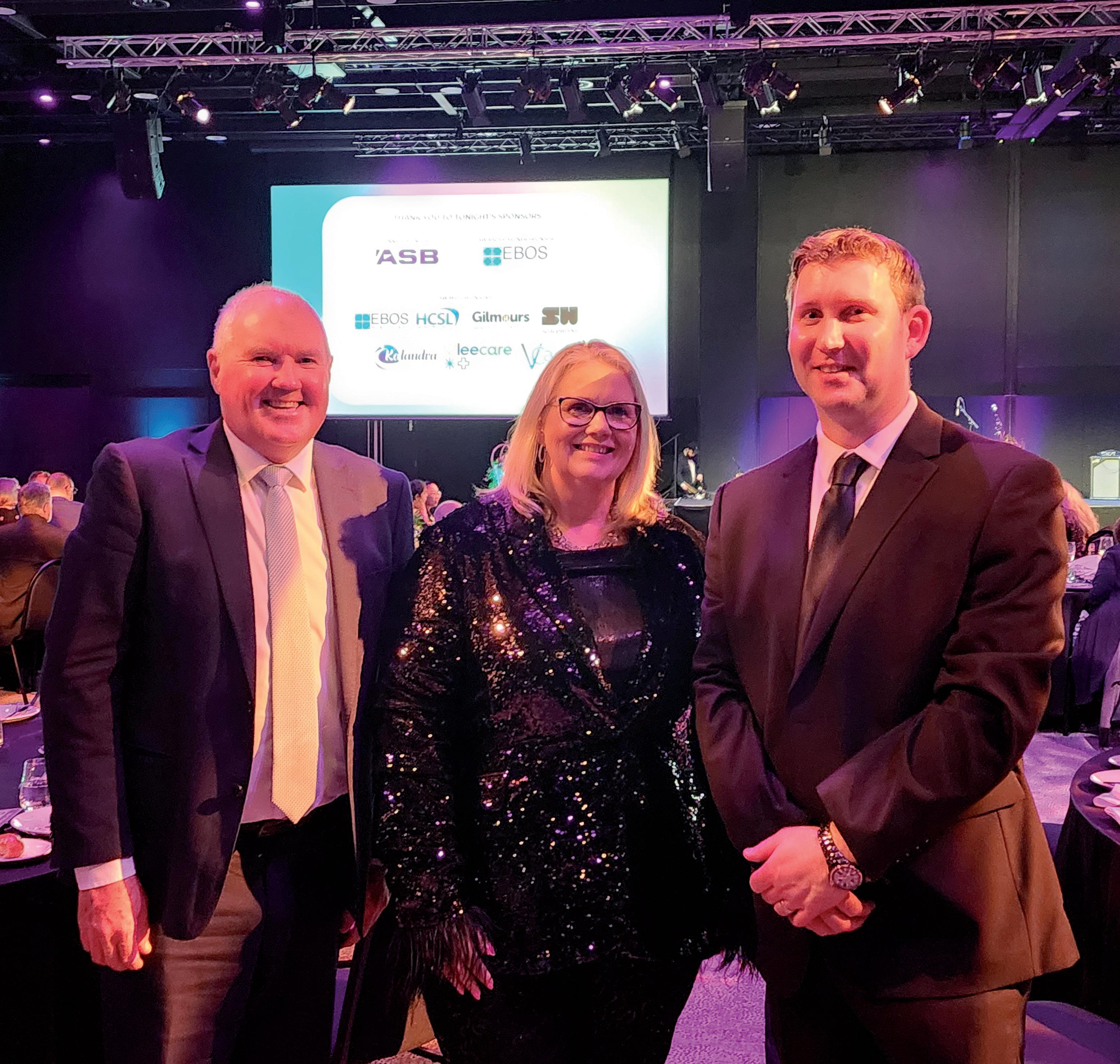
“Retirement village food is not boring and dull; the great thing is you get feedback daily. The residents will tell you if they like it, and I enjoy forming those relationships with people.”
His advice to young talent starting in the industry is to be patient with their approach and focus on the tasks in front of them. From his experience, it can be easy to be overwhelmed due to lacking skills and knowledge, but everything will become clearer over time.
“Timing is the most important thing to me in the kitchen. Cooking is a time-critical job and essential to both the management of the kitchen and delivery.”
